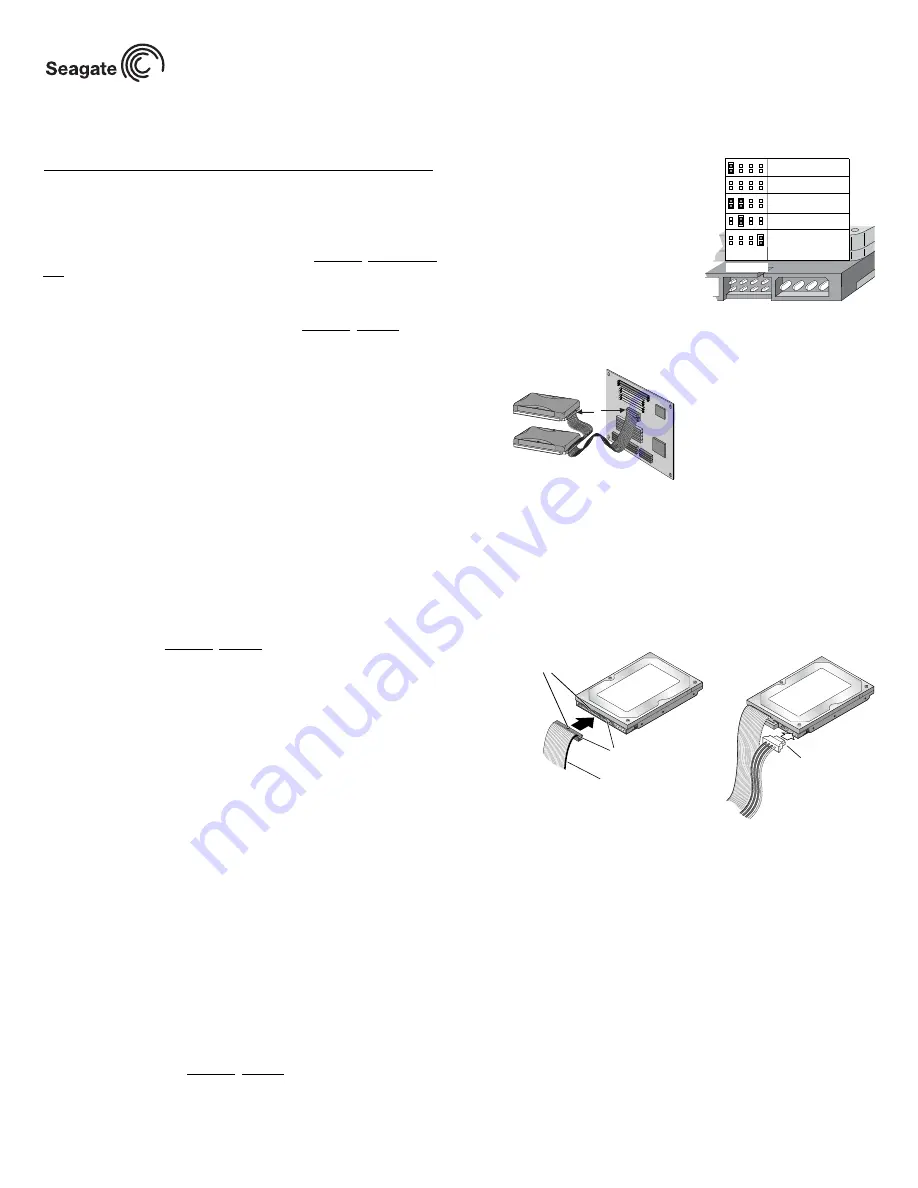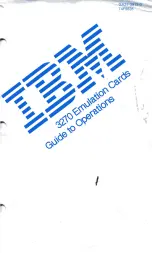
Note.
When configuring two ATA devices on
the same cable, both must use Cable
Select or both must use Master/Slave
jumper settings. If using a standard
40-pin cable, the master and slave
drives can be placed in any position. If
using a 40-pin 80-conductor cable, attach
the blue connector to the motherboard,
the black connector to the master drive
and the grey connector to the slave.
Computer
Motherboard
Pin 1
Master
Slave
Barracuda 7200.7 Installation Guide
ST3200822A, ST3200021A, ST3160021A, ST3160023A, ST3120022A,
ST3120026A, ST380011A, ST380013A, and ST340014A
ATA Interface Disc Drives
Publication Number: 100217284, Rev. B, September 2003
The easiest way to install your drive
DiscWizard
TM
, available exclusively from Seagate®, provides you with cus-
tomized installation instructions for your hard drive. You can get this free
disc drive installation software from our web site at www.seagate.com/sup-
port or run the program directly from your web browser. In either case, you
should run DiscWizard
before
you install your drive.
To run DiscWizard:
Follow the instructions on the download page at www.seagate.com to cre-
ate a diskette and complete the installation.
If you cannot run DiscWizard
, follow the instructions on this installation
sheet to install and configure your drive.
What you need
• A Phillips screwdriver and four 6-32 UNC drive mounting screws
• An ATA interface cable. For optimum drive performance and data integ-
rity, use an 80-conductor Ultra ATA/100 cable (which can be identified by
its blue, gray, and black connectors).
Ultra ATA/100 requirements
The drive can be configured to support a default maximum transfer rate.
This drive can support transfer rates up to 100 Mbytes per second (UDMA
5) in Ultra ATA/100 mode. Using a software utility, you can set the default
transfer rate to the best capability of your system. For your drive to run in
this mode, you need the following:
• A computer that supports UDMA mode 5
• A 40-pin, 80-conductor cable (available from your computer dealer)
• A software utility to confirm and activate Ultra ATA/100. Seagate pro-
vides a utility called UATA100.exe. You can download the latest version
from our web site at www.seagate.com.
• Windows XP, Windows Me, or Windows 98 operating system which sup-
ports Ultra ATA 100.
Large disc requirements (for capacities over 137 Bytes)
To realize the full capacity of drives over 137 Gbytes:
• Use an operating system that supports 48-bit addressing:
- Microsoft Windows XP Home with Service Pack 1
- Microsoft Windows XP Professional with Service Pack 1
- Windows 2000 Professional with Service Pack 3
- Windows 2000 Server with Service Pack 3
• Use a 48-bit compatible Ultra ATA/133 PCI host adapter card or connec-
tor on your motherboard.
See the http://support.seagate.com for additional information.
Handling precautions/electrostatic discharge protection
• Disc drives are fragile. Do not drop or jar the drive. Handle the drive only
by the edges or frame.
• Drive electronics are extremely sensitive to static electricity. While
installing the drive, wear a wrist strap and cable connected to ground.
• Turn off the power to the host system during installation.
• Do not disassemble the drive; doing so voids the warranty. Return the
entire drive for depot service if any part is defective.
• Do not apply pressure or attach labels to the drive.
Setting the jumpers
Refer to the jumper settings illustration below or on your drive label to con-
figure the drive for your system. Jumper settings can also be accessed
online from our web site at www.seagate.com.
•
Master or single drive:
The drive is shipped configured for a master or
a single drive with a jumper set on pins 7 and 8.
•
Drive is slave:
To configure the drive as a slave or second drive on the
cable, remove all the jumpers.
•
Master with non-ATA compatible slave:
Use this setting if the slave
drive is not recognized. Configure the master drive with a jumper set on
pins 5 and 6 and pins 7 and 8 to enable this option.
•
Cable select:
Computers that use cable select to determine the master
and slave drives by selecting or deselecting pin 28, CSEL, on the inter-
face bus. To enable cable select, set a jumper on pins 5 and 6.
•
Alternate capacity jumper:
Drives
with a 40-Gbyte capacity or greater
are limited to 32 Gbytes. Use this
jumper only if you have a legacy sys-
tem with a BIOS that does not support
large capacity disc drives. When
using the alternate capacity jumper,
• Manager software is required to
achieve the drive’s full capacity.
Attaching cables and mounting
the drive
1.
Attach one end of the drive interface
cable to the interface connector on your computer’s motherboard (see
your computer manual for connector locations).
Caution.
Align pin 1 on the motherboard connector with pin 1 on your
drive connector. Pin 1 is marked by a stripe on one side of the
cable.
2.
Secure the drive using four 6-32 UNC mounting screws in either the
side-mounting or bottom-mounting holes. Insert the screws no more
than 0.20 inches (5.08 mm) into the bottom-mounting holes and no
more than 0.14 inches (3.55 mm) into the side-mounting holes.
Note.
Do not overtighten the screws or use metric screws. This may dam-
age the drive.
3.
Attach the interface connector and the power connector to the drive.
Configuring the BIOS
Close your computer case and restart your computer. your computer may
automatically detect your new drive. If your computer does not automati-
cally detect your new drive, follow the steps below.
a.
Restart your computer. While the computer restarts, run the System
Setup program (sometimes called BIOS or CMOS setup). This is usu-
ally done by pressing a special key, such as DELETE, ESC, or F1 dur-
ing the startup process.
b.
Within the System Setup program, instruct the system to auto detect
your new drive.
c.
Enable LBA and UDMA modes, if available and then save the settings
and exit the Setup program.
When your computer restarts, it should recognize your new drive. If your
system still doesn’t recognize your new drive, see the troubleshooting sec-
tion on the back of this sheet.
Key on cable connector
fits into slot on drive connector
Pin 1
Stripe on cable
Power connetor
Options jumper block
2
6
8
4
1
7 5 3
Drive is slave
*Master or single drive
*Cable select
Master with non ATA-
compatible slave
Alternate capacity.
Limits drive capacity
to 32 Gbytes




















